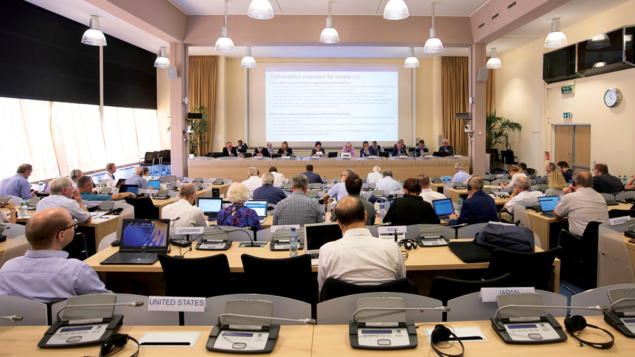
At its 208th meeting on 16 June, the CERN Council announced further measures in response to the continuing illegal military invasion of Ukraine by the Russian Federation with the involvement of the Republic of Belarus. The Council declared that it intends to terminate CERN’s International Cooperation Agreements (ICAs) with both countries at their expiration dates in 2024. However, the situation will continue to be monitored carefully and the Council stands ready to take any further decision in the light of developments in Ukraine.
CERN’s ICAs normally run for five years and are tacitly renewed for the same period unless a written notice of termination is provided by one party to the other at least six months prior to the renewal date. The ICA with the Russian Federation expires in December 2024, and that with the Republic of Belarus in June 2024.
The latest measures follow those already adopted at an extraordinary meeting of the Council on 8 March, and at the Council’s regular session on 25 March. In addition to the promotion of initiatives to support Ukrainian collaborators and Ukrainian scientific activity in high-energy physics, these measures included the suspension of Russia’s Observer status and the decision not to engage in new collaborations with Russia and its institutions until further notice (CERN Courier May/June 2022 p7).
The Council also decided in June to review CERN’s future cooperation with the Joint Institute for Nuclear Research (JINR) well in advance of the expiration of the current ICA in January 2025. This follows measures adopted at the previous Council sessions to suspend the Observer status of JINR and the participation of CERN scientists in all JINR scientific committees, and vice versa, until further notice. The Council reaffirmed that all decisions taken to date, along with the actions undertaken by the CERN management, which have had a marked impact on the involvement of the Russian Federation and the Republic of Belarus in the scientific programme of the organisation, remain in force.
Ukraine joined CERN as an Associate Member State in 2016 and Ukrainian scientists have long been active in many of the laboratory’s activities. Russian scientists also have a long and distinguished involvement with CERN, and Russia was granted Observer status in recognition of its contributions to the construction of the LHC. At the June Council meeting, the Member States reiterated their denunciation of the continuing illegal military invasion, recalling that the core values of CERN (CERN Courier September/October 2022 p49) have always been based upon scientific collaboration across borders as a driver for peace, and stressing that the aggression of one country against another runs counter to these values.








